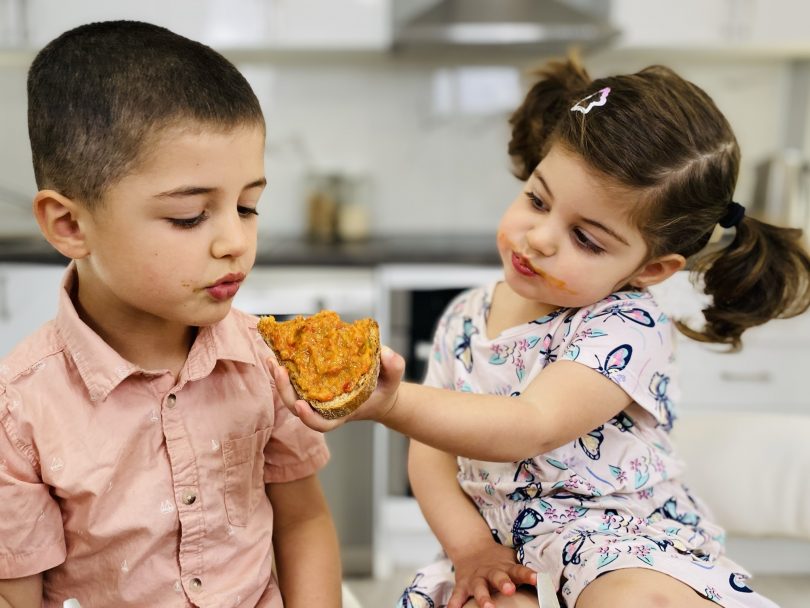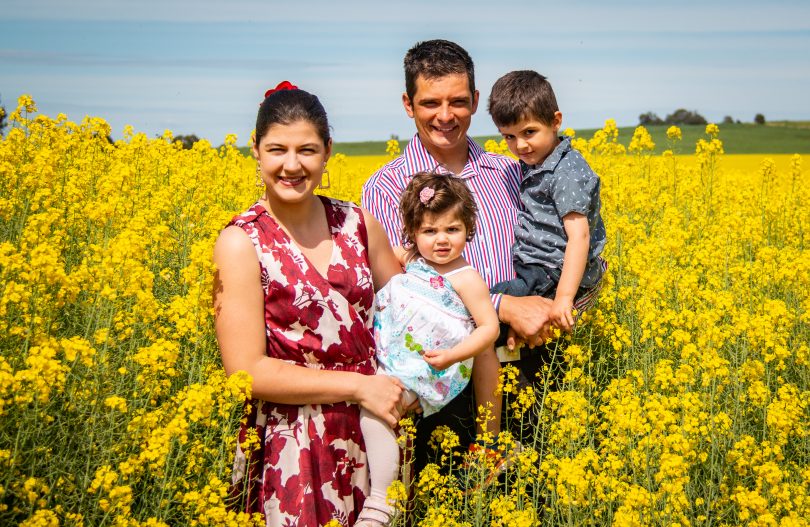
Romanian Delights founder Alina Piloiu with her children, Raoul, 5, and Sarah, 2. Photo: Supplied.
In 2015, Alina Piloiu and her husband, Dani, moved to Australia with two pieces of luggage.
The young couple had met in Sibiu, Romania, in 2012, while Alina was studying to become a translator.
Soon after, she received a scholarship for a traineeship in Luxembourg, and from there, they took what money was left – enough for a one-way ticket – and decided to seek a better life Down Under.
“Romania was in a bad economic state at the time – a lot of unemployment,” says Alina.
Most new arrivals can’t wait to experience Queensland’s tropical climate, or Sydney’s iconic sites, but not this couple.
“We met a couple online who ran a cattle farm in Binda, NSW,” says Alina. “My husband had worked for a dairy farm when he was younger and he wanted to learn about beef cattle so we decided to head there and stay in their cottage.”
Binda is situated in the NSW Southern Tablelands, west of Crookwell, and is home to 280 people. It’s classified as regional Australia and is remote if you don’t drive.
“It was a huge change from the city life both of us grew up with and knew in Romania,” says Alina. “And I didn’t have a licence so I had to rely on my husband to take me anywhere and everywhere.”
Within a year, Alina was pregnant with their son, Raoul, which made living remotely even more challenging.
“I was stuck at home all day and not able to go anywhere,” she says. “I’d be dying for Dani to come home for lunch or finish work.”

Raoul and Sarah Piloiu can’t get enough of mum’s zacusca. Photo: Supplied.
It’s a notion most farmer’s wives and stay-at-home mums can relate to, and it only grew worse as Alina longed for her parents and in-laws to be around her and the couple’s newborn child.
But as the economic situation in Romania worsened, the chances of family visiting dwindled.
In the absence of family, Alina leant on her friends and turned to the home cooking she’d always loved. This provided her with a sense of comfort.
“We were having a get-together and I brought a platter with my zacusca, crackers and cheese,” she says. “I said, ‘This is a Romanian thing we make.’ My friends thought it was so amazing they told me to bottle it.”
Romanians make zacusca at the end of summer as a way to preserve vegetables to eat during their long, harsh winters, which can last up to five months.
Alina had learnt how to make a traditional eggplant zacusca from her mother and grandmother, who she grew up with, and knew how to make it preservative, sugar and gluten-free, and vegan.
She began by making a few jars from her home kitchen to test at the Rotary markets in Goulburn, which were almost a disaster.
“We only had a tiny table that had been lent to us by a friend,” says Alina. “It was about 1.2 metres by 60 centimetres wide; an old tablecloth lent to us by the people who owned the cottage we were living in; and the jars and handmade labels were stuck on with glue.

The Piloiu family now lives in Cowra and say they will never leave regional Australia. Photo: Supplied.
“That day it rained and we didn’t have a gazebo. We had no idea what a stall at an Australian market should look like and all the people around us had fancy gazebos. But by the end of the day, I’d sold out.
“People didn’t care how it looked; they cared how it tasted and that’s how I realised I had a good product.”
The more markets Alina and Dani visited, the more people requested new flavours.
Alina has since added a beetroot, chilli and mushroom zacusca to the range that is now professionally packaged as Romanian Delights.
Alina makes her products in a commercial kitchen in Cowra – where she, Dani, Raoul and their two-year-old daughter, Sarah, now live – and are sold in IGA supermarkets in Crookwell, Young and Bathurst.
Dani is still farming and Alina is growing the business, with hopes to go nationwide and leave it as a legacy for her children.
Original Article published by Hannah Sparks on About Regional.












